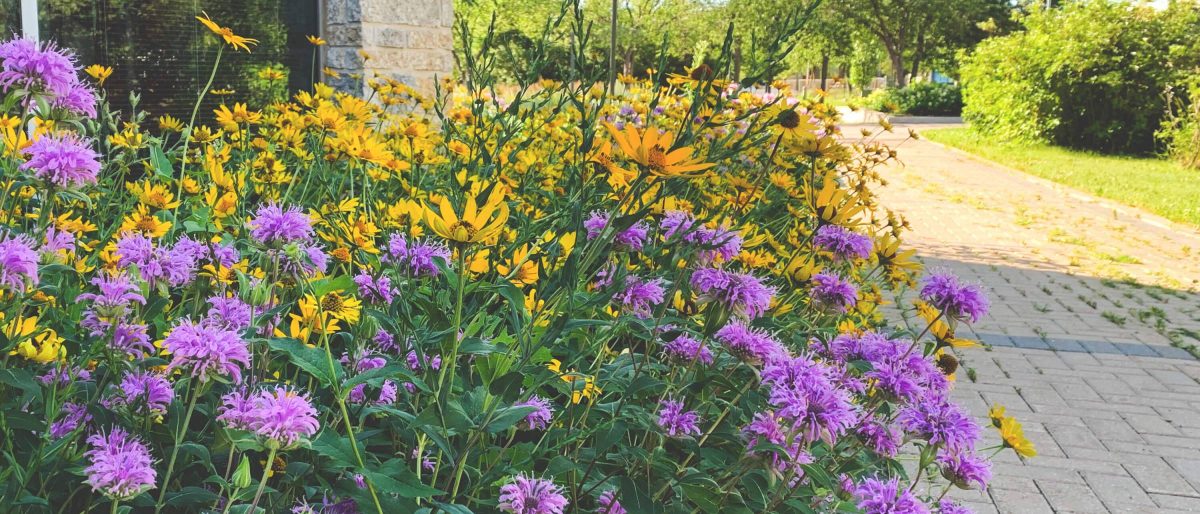
Development of The Garden for Wellbeing will nurture mental health
Provide your feedback at the community consultation on March 18 and 19
A Garden for Wellbeing is being created at UM. This unique, accessible and inclusive landscape will nurture community mental health and wellbeing on the Fort Garry Campus.
Nestled between the Red River and Freedman Crescent, the garden will be a place for self-reflection, contemplation and connecting with the land, open to the UM community and the public.
“This project is a chance for the university community to engage with a space on campus that deliberately invites them to look inward and outward at the same time,” says Rebecca Brooks, a member of the Garden for Wellbeing project team. “There will be areas for calm and contemplation as well as aspects that invite them to think critically about our place on the land and in our relationships.”
Prioritizing Indigenous planning and design principles
The site will celebrate Indigenous aesthetics and draw on Indigenous design principles, says Nicki Ferland, a member of the Indigenous Stewardship Committee, one of the groups on campus that provided guidance on this project.
Ferland, who is also the Community Engaged Learning coordinator, Indigenous, says the landscape has several exciting features. “The Garden will provide a quiet space for reflection, introspection and learning, [and it] provides opportunities to reintroduce natural features to the Garden site near the south bank [of the Red River].”
We want to hear from you
A cornerstone of the project is community consultation and involvement. Two design proposals are being created by architectural firm ft3 in collaboration with Indigenous environmental consultants Narratives and will be shared in community consultation sessions on March 18 and 19 in UMSU University Centre.
Drop in, view renderings of the two designs and help shape the development of the Garden for Wellbeing. Snacks will be provided.
Community consultation
March 18-19, 2024 | 9:30 AM – 3:30 PM (Drop-in)
Bistro 205, 2nd Floor, UMSU University Centre
Fort Garry Campus
Snacks will be available while you view the designs.
If you can’t attend the in-person drop-in session, there will be an opportunity to view the renderings and provide feedback on the website.
Connecting to the community
The Garden for Wellbeing project is the realization of a 2019 UM Success Through Wellness Grant. It is led by the Centre for the Advancement of Teaching and Learning, Office of Sustainability, Strategic Communications, and Architectural & Engineering Services in close collaboration with the Indigenous Stewardship Committee.
“The original inspiration for this project was a Eurocentric labyrinth,” says Brooks, who is also the team lead for programs at the Centre for the Advancement of Teaching and Learning. “Now it has become much more reflective of our UM community through the perspectives and guidance of Indigenous colleagues.”
“The Garden provides an opportunity to highlight other major Indigenous projects on campus including Raven Medicine Cloud and Cyclical Motion: Indigenous Art and Placemaking,” says Ferland.
“These projects and connections help expand awareness of Fort Garry Campus’s Indigenous past, present and future,” she says.
Initial stakeholder consultations determined that the design should incorporate the image of a bison. The landscape will connect to walking and cycling paths on campus and in the neighbourhood.
It will also provide opportunities for the community to learn from the land, incorporating native plants which are low maintenance to encourage user participation in its care.
“My hope is that the Garden for Wellbeing will be a pause in our busy days. So often people are in a rush or feel behind, and the Garden will be a space where anyone can come and be present and explore a different sense of time than we’ve become accustomed to,” says Brooks.






